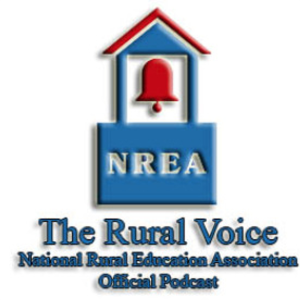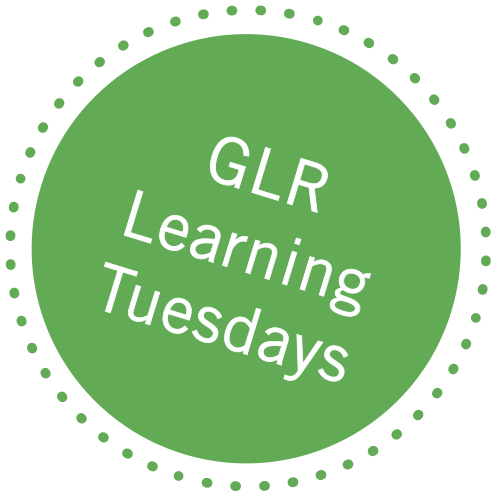Congratulations to Laurie Smith! She was chosen as the National Teacher of the Year for the National Rural School Association! Today Jack Moles, President of the Nebraska Rural School Community Association stopped by to congratulate Mrs. Smith. |
|
|  |
For this episode of the Rural Voice, our cohosts Drs. Bigham and Pratt interview Dr. Landon Mascareñaz and Ms. Shannon Nicholas about rural planning, partnerships, and connections between business and education and ways to capitalize on partnerships to better serve rural school districts. They discuss their work and advocacy in Colorado to connect rural school districts with partnerships that align market needs with educational goals. This includes how rural districts of different sizes capitalize on outcomes, goals, and building graduate profiles, including the larger community in its deployment. Our guests share how career-connected learning and partnerships have helped many schools, but at times, lacked connections to rural communities. They discuss creating a graduate profile for students, family, and community to help make education successful. They discuss many of their programs in giving schools and school districts the tools needed to generate innovative and novel approaches. They also discuss methods for organizing partnerships of the willing. Ms. Shannon Nicholas is Chief of Staff at Colorado Succeeds, where she works closely with the President and the Board of Directors on the organization's strategic priorities. In her role, she oversees the communications, advocacy, and program implementation teams. Dr. Landon Mascareñaz is Vice President of Community Partnership at Colorado Education Initiative (CEI), where he leads community engagement, family partnership, equity, and policy initiatives. |
| | Read More |
|
|
|  |
The return to school this year is more challenging than anyone could have anticipated given recent surges in COVID-19. As national and local leaders respond to these immediate crises, many are also looking for opportunities to apply the lessons learned from last year as they plan for a “new normal” that is firmly grounded in a commitment to creating equitable learning conditions and experiences for every young person in America. Join the Campaign for Grade-Level Reading on September 7, from 3-4:30 p.m. ET, to hear a panel of exceptional national leaders―Linda Darling-Hammond, President, and CEO, Learning Policy Institute; Sal Khan, Founder, and CEO, Khan Academy; Karen Mapp, Faculty Director, Education Policy and Management Master's Program, Harvard Graduate School of Education; and Rey Saldaña, President and CEO, Communities In Schools―discuss strategies to accelerate equitable learning recovery and longer-term systems change. After the panel, Superintendent Dr. Debra Duardo of Los Angeles County Office of Education, Dr. Allen Pratt of National Rural Education Association, and Superintendent Dr. Avis Williams of Selma City Schools will share how they are starting the new school year with a deep focus on the science of teaching and learning, education technology, family and community engagement, and the centrality of student well-being and support. Register here. |
| | Read More |
|
|
| Rural Educator Weekly Spotlight: |
|
|
|
| Eizabeth S. Wargo and Jeff Simmons University of Idaho
Abstract This piece offers a systematic review of rural (P-12) education technology literature. Drawing upon a social change frame (Ogburn, 1922), current rural education technology research within the subfield is collected, examined, and synthesized. Findings explicate that methodological diversity is a strength; however, some populations (e.g., middle school teachers) have thicker coverage than others (e.g., high school students). Additionally, many studies lean on rhetorical structures about what could and should be happening in rural schools, rarely delving into the how’s and whys associated with actual technology use in rural contexts. The piece concludes with a call for a scholarship that assists in shifting power structures to support rural schools in their efforts to work with technology for the betterment of rural students and communities in place. |
| | Read More |
|
|
| New School Year Highlights Urgency to Close Broadband Gap for America’s Students |
|  |
Permanent Solutions to Bridge the Digital Divide is Critical to Securing Educational Equity, Opportunity and Success for Young People As students across the country head back to school, the urgency to close the broadband gap to secure educational equity, opportunity, and success for all have never been clearer.
Prior to the COVID-19 pandemic, more than 15 million American students (30 percent of public school attendees) lacked broadband service, a device, or both needed to support distance learning at home. That number climbed during the pandemic to as many as 17 million students. As the pandemic took hold in the spring of 2020, a reported 29 percent of U.S. students were doing homework on a cellphone while 22 percent had to finish the homework on a public Wi-Fi connection because they had no home access, according to Pew Research.
Studies show that students without home access to broadband internet are less likely to plan to attend college, face a digital skills gap equivalent to three years’ worth of schooling and score lower on standardized tests.
In addition, access to affordable, reliable broadband has a direct impact on young Americans’ outlook on life and their confidence in future success, according to a recent survey from the National 4-H Council, the Harris Poll, and the 4-H Tech Changemakers coalition.
The survey also found young adults in America believe a lack of broadband internet is continuing to create economic and social inequities in communities across the nation and overwhelmingly support urgent government action to close the digital divide.
According to the survey partners: “The lack of access has significant effects on the lives of young people, with the survey results demonstrating notable differences in confidence levels between teens with and without access to high-speed internet in areas like graduating from high school (92 percent vs 89 percent), having a successful career (88 percent vs 81 percent), having financial success (85 percent vs 80 percent), and life overall (85 percent vs 74 percent). Unreliable internet access also leads to significant gaps in digital skills, despite widespread agreement among teens that “digital skills will be the key to getting the best jobs for my generation” (73 percent agree).” We cannot allow these students to fall through the cracks simply because they lack a broadband connection at home.
Congress can make a positive first step toward bridging the digital divide by swiftly passing the bipartisan Infrastructure Investments and Jobs Act, which includes a $65 billion down payment on tackling this challenge, into law. Lawmakers must also build on the unprecedented momentum for action by advancing additional, permanent solutions to ensure every student in America, regardless of zip code, has access to an affordable, reliable internet connection and the digital opportunity it supports.
Read more on how the bipartisan infrastructure package will help expand broadband access HERE.
Learn more about solutions to permanently close the broadband gap HERE.
Read more on CAN and our mission HERE. |
|
|
|
| Sharing Information From Our Partners and Sponsors: |
|
|
|
Each year at our annual conference, The NREA Foundation hosts a silent auction and president's reception. This year's event will take place on November 11th, 2021 at 5:30 PM. The foundation uses the donations from the event to fund our national essay contest and provide grants to teachers. This would not be possible without our sponsors. Our sponsors for this year's event are Boardworks, Defined Learning, and Better Lesson. Thank you for your willingness to help rural schools and communities. Please visit their sites highlighted below. |
|
|